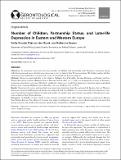Files in this item
Number of children, partnership status, and later-life depression in Eastern and Western Europe
Item metadata
| dc.contributor.author | Grundy, Emily | |
| dc.contributor.author | van den Broek, Thijs | |
| dc.contributor.author | Keenan, Katherine | |
| dc.date.accessioned | 2017-07-28T12:30:08Z | |
| dc.date.available | 2017-07-28T12:30:08Z | |
| dc.date.issued | 2017-05-03 | |
| dc.identifier | 250544652 | |
| dc.identifier | a1611536-b93c-47b5-b2a3-0b21b49e7dc4 | |
| dc.identifier | 85054338852 | |
| dc.identifier.citation | Grundy , E , van den Broek , T & Keenan , K 2017 , ' Number of children, partnership status, and later-life depression in Eastern and Western Europe ' , Journals of Gerontology Series B: Psychological Sciences and Social Sciences , vol. Advance Access . https://doi.org/10.1093/geronb/gbx050 | en |
| dc.identifier.issn | 1079-5014 | |
| dc.identifier.other | RIS: 12 | |
| dc.identifier.other | ORCID: /0000-0002-9670-1607/work/35292656 | |
| dc.identifier.uri | https://hdl.handle.net/10023/11316 | |
| dc.description | The research leading to these results has received funding from the European Research Council under the European Union’s Seventh Framework Programme (FP7/2007–2013)/ ERC grant agreement n° 324055. | en |
| dc.description.abstract | Objectives: To investigate associations between number of children and partnership with depressive symptoms among older Europeans and assess whether associations are greater in Eastern than Western countries. We further analyze whether associations are mediated by provision and receipt of emotional and financial support. Methods: Using cross-sectional data for five Eastern (Bulgaria, Czech Republic, Georgia, Romania, and Russia) and four Western European countries (Belgium, France, Norway, and Sweden) (n = 15,352), we investigated variation in depressive symptoms using linear regression. We fitted conditional change score models for depressive symptoms using longitudinal data for four countries (Bulgaria, Czech Republic, Georgia, and France) (n = 3,978). Results: Unpartnered women and men had more depressive symptoms than the partnered. In Eastern, but not Western, European countries childlessness and having one compared with two children were associated with more depressive symptoms. Formal tests indicated that partnership and number of children were more strongly associated with depressive symptoms in Eastern than Western Europe. Discussion: Availability of close family is more strongly associated with older people’s depressive symptoms in Eastern than Western Europe. The collapse of previous state supports and greater economic stress in Eastern Europe may mean that having a partner and children has a greater psychological impact than in Western countries. | |
| dc.format.extent | 11 | |
| dc.format.extent | 318358 | |
| dc.language.iso | eng | |
| dc.relation.ispartof | Journals of Gerontology Series B: Psychological Sciences and Social Sciences | en |
| dc.subject | Depression | en |
| dc.subject | Generations and Gender Surveys (GGS) | en |
| dc.subject | Intergenerational relationships | en |
| dc.subject | Long-standing illness | en |
| dc.subject | Partnership status | en |
| dc.subject | Support exchange | en |
| dc.subject | H Social Sciences (General) | en |
| dc.subject | HM Sociology | en |
| dc.subject | BF Psychology | en |
| dc.subject | 3rd-DAS | en |
| dc.subject.lcc | H1 | en |
| dc.subject.lcc | HM | en |
| dc.subject.lcc | BF | en |
| dc.title | Number of children, partnership status, and later-life depression in Eastern and Western Europe | en |
| dc.type | Journal article | en |
| dc.contributor.institution | University of St Andrews. Geography & Sustainable Development | en |
| dc.identifier.doi | https://doi.org/10.1093/geronb/gbx050 | |
| dc.description.status | Peer reviewed | en |
This item appears in the following Collection(s)
Items in the St Andrews Research Repository are protected by copyright, with all rights reserved, unless otherwise indicated.

